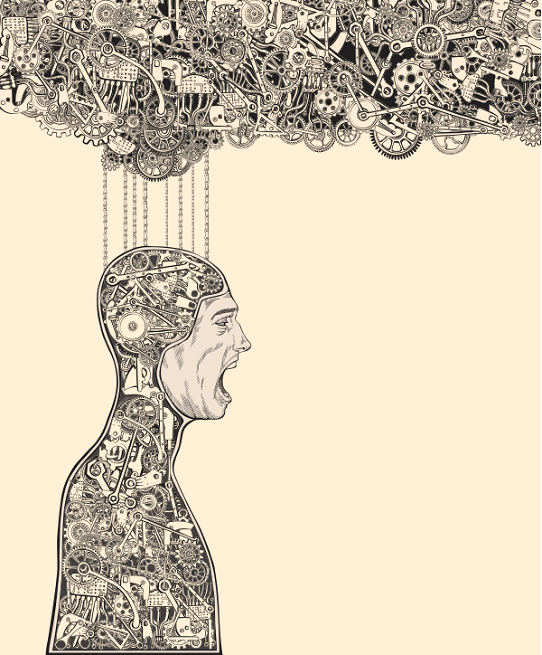Psychology is a science about the facts, the laws and the essence of the psyche, which is a function of the animal organism and forms the subjective and ideal image of the objective stimulus (external and internal) and emotional relations with them to which the image and attitude balance and manage the behavior of the individual, and in man his active, creative and conscious activity (play, learning, labor, communication), which has a social character and is a basic means of realization the existential needs of the personality, its socio-cultural development and self-reliance.
Here is emphasized the fact that: - psychology is oriented to the empirical level of psychic facts and their laws; - psyche is a function of the animal organism - arises with the appearance of the first animal forms; - a subjective look is formed of the external structures. The activity of the individual is characterized by emotional attitude, - the psyche balances and manages the behavior of the individual, - the behavior of the individual has a creative and conscious character in the main activity (learning, play, labor), - basic activities of a social nature. Every science has a core. There are four main categories: subject / method /; categories of science; principles; problems. These are a system of categories that give the most common model of science in its development. The subject of psychology is dynamic. Psychological knowledge changes at all existing levels. It changes both at the level of life psychology and at the highest theoretical level, ie. on the level of the possibilities of psychological science and of psychological research to penetrate deeper into the human spirit, to illuminate ever wider spheres of psychic life. So psychology is a problem field, like a mosaic, filled primarily with phenomena. These phenomena share a common quality experience. They appear to us as states of ours, people / and possibly other living beings /, and oppose to facts of an objective origin that can be called a "physical world" and a "world of ideas." Psychologists have a lot to be proud of.
They deal with the most cherished phenomena of which everyone is interested - human nature, the internal determinants of individual activity, the purpose of man. On these issues, the classics of psychology have made lasting contributions that are worth knowing for every educated person. Psychology is probably the most prestigious science at the beginning of the third millennium. If we look at it unprejudicially, psychologists engage in a large number of practical tasks: teaching, research projects, diagnostic procedures, practical interventions, psychotherapeutic effects, staff assessment, improving the public image of individuals and institutions, judicial and criminal expertise, ads and in marketing campaigns, etc. All of these activities are very different from each other, but they also contain something psychologically unifying: they mean human experiences and try to change them. The real subject of psychology is to provide only experiences that are significant and accessible for research. In the statement that psychology is interested in the experience, the main focus of the study is considered. In one applied plan, psychology is recognized to study and improve all social practices in which individuals experience experiences.
Traditionally the complex problem of psychology is and remains in the discovery of methods of scientific study of the psyche, adequate to the nature of the psychic, its essence, the structure and the ontological feature. It is for this reason that psychology, as a science of being, has the task of defining the nature of things as they are and what they exist, necessarily benefiting from the data of the various private sciences. It is clear that psychological science faces a fundamental problem - to create a concept of mental ontology and to achieve adequate methods for its research. This task, however, can not be solved in the conditions of the unfolding confrontation between the different schools and strands, nor by the silent refusal to deal with these fundamental problems because they are the theory of other sciences.

nice about psychology.
Downvoting a post can decrease pending rewards and make it less visible. Common reasons:
Submit
you are welcome :)
Downvoting a post can decrease pending rewards and make it less visible. Common reasons:
Submit
yes so nice post
Downvoting a post can decrease pending rewards and make it less visible. Common reasons:
Submit
What a great post that you have written about physchology
Downvoting a post can decrease pending rewards and make it less visible. Common reasons:
Submit
Was a nice read, actually it's the best thing i could read for my first post.
I recommend C. G Jung
Downvoting a post can decrease pending rewards and make it less visible. Common reasons:
Submit
Nice post. I think psychology is just a topic created so that we can think that there is something inside us telling us what to do in the real sense its just you
Downvoting a post can decrease pending rewards and make it less visible. Common reasons:
Submit
You have recieved a free upvote from minnowpond, Send 0.1 -> 10 SBD with your post url as the memo to recieve an upvote from up to 100 accounts!
Downvoting a post can decrease pending rewards and make it less visible. Common reasons:
Submit
Great
Downvoting a post can decrease pending rewards and make it less visible. Common reasons:
Submit